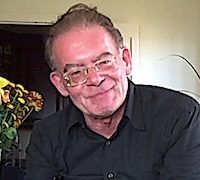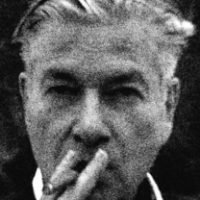. . . after five-mile walk . . . in rural retreat . . . too bad the video does an injustice to the vivid colors of the leafy green cathedral of trees, the red-brown earth of the road and, most of all, to the rich scent of pine in the air.
Collage by Late Cubist, Age 8, Bored in Lockdown
Boredom sometimes works wonders . . . with teacher’s help.
Latest Find Thrills Collector of Rare Burroughs/Gysin Books
Jeff Ball’s latest acquisition—a first-edition copy of “The Exterminator”— is not only signed by both William Burroughs and Brion Gysin but has original artwork that Gysin drew and signed on an inside page. “I’m giddy!” says Ball, whose collection of rare first editions by Burroughs and associated writers, includes some of the most hard-to-find materials anywhere.
GC CUNY Keeps the Conversation Going:
Activists of the Civil Rights Movement
This week, for a historical perspective on protest movements, The Graduate Center, CUNY, highlights a discussion with civil rights leaders of the ’60s from its video archive. The discussion is moderated by Carol Jenkins, host of Black America on CUNY-TV. Guests include Ruby Sales, a key figure in the Alabama “Freedom Summer” voter registration drive, and Reverend Herbert Daughtry, who played an instrumental role in the struggle for school desegregation. Clarence Taylor, professor of history at The Graduate Center and Baruch College, provides commentary.
In My Rural Corner of Trumpistan
. . . the protest is peaceful . . . and on Sunday it was heartfelt.
Speaking of Translation
“My texts belong to the world / Even when they are forged copies / My translators complain of climbing steps to attics / They complain of sifting through the debris in basements / They complain over the endless boxes stored / In countries that don’t even allow them entry / A watchdog guards a box somewhere in Moscow / An irate lover protects another box / My translators complain of bad backs and dust / One translator complained because of the food …” —William ‘Cody’ Maher
Genes of Irish Genius in ‘Blooming Molly Malone’
A friend writes: A little re-Joyceing in this wee lonesome blooming Molly Malone. You can hear the genes of Irish genius in the DNABC of this little clamourer. You feel she’s on the verge of channelling Beckett, Behan, O’Casey, O’Brien, Yeats et al, at any moment. A true antidote to popery and nunnery, and the cold, cold kiss of Covid. A little four-leaf clover complaining from beneath the cloven hoof of parental devilry. She must have been fed Guinness in the womb, there’s so much blarney in her tongue. Man, you feel she possesses such alchemical witchery, she could eat Covid, and shit it out the other end as an emerald. A rare little island of hope.
For Carl Weissner’s Would-Be 80th
Coming on June 16th: “Death in Marseille,” the last words of Arthur Rimbaud as imagined by Carl Weissner. To be published in a limited handmade edition designed by Gerard Bellaart, and translated and edited from the German by Keith Seward & Jan Herman.
GC CUNY Keeps the Conversation Going:
LGBTQ Pride Month Conversation with Patrisse Cullors, co-founder of Black Lives Matter
Artist, organizer, and co-founder of Black Lives Matter, Patrisse Cullors is the co-author of the best seller “When They Call You a Terrorist: A Black Lives Matter Memoir.” At the age of 16, Cullors discovered her passion for helping young queer women facing the challenges of poverty, prejudice, and violence. In 2013, she co-founded the #BlackLivesMatter movement, which has grown into an international organization fighting anti-Black racism. She spoke with Justin T. Brown, executive director of CLAGS: The Center for LGBTQ Studies.
Lilliane Lijn’s ‘Power Hanky’
Makes me think of … “Summertime.”
The Language + Her Voice + Their Music = Heaven
This is bliss . . . and so is this . . . especially in tough times. MEDITAÇAO & CHEGA DE SAUDHADE (A.C.JOBIM) ANDREA MOTIS Y JOAN CHAMORRO LIVE AT JAMBOREE — Barcelona :: Andrea Motis & Joan Chamorro Quintet Featuring Scott Hamilton [Andrea Motis, voz ,trompeta & saxo; Joan Chamorro, contrabass; Scott Hamilton, tenor sax; Ignasi Terraza, piano & Hammond; Josep Traver, guitarra Esteve Pi, drums.]
Moloko+ Releases Maher’s New Poems in Bilingual Edition
“This is a partial autobiography. The important things are missing.” — William Cody Maher
The collection includes photographs by Signe Mähler. The German translations are by Walter Hartmann.
The poet reads an excerpt from his poem, “Pornography.”
Remembering the Covid-19 Dead in Trumpistan
It’s not just a list of names. As the NYT story says, the loss is “incalculable.”
Coping with the Shitstorm #8
For a high-speed Sunday morning . . . Paul Altman commented on YouTube, “Lennie had the bass and drums recorded, and then using the reel-to-reel technology of that time, slowed them down to half speed, and then recorded the solo as an overdub an octave lower and at 1/2 of the speed released here. Then he sped the whole thing back up by 2X so that the bass and drums returned to their original recorded pitch and speed, but his piano solo was now twice as fast, and an octave higher, than he recorded it at. [Some people think that’s cheating, but] I’m not sure what all the fuss is about. Maybe some people assume that mediocre playing can be made to sound superlative by merely doubling the speed. But it doesn’t work that way. It just ends up sounding like fast, mediocre music.”
Clayton With a Period, Full Stop
Over the years two dozen items about or related to Clayton Patterson have appeared on this blog. It’s an indication of the staff’s interest in his cultural significance. Patterson’s importance in general, but especially on the Lower East Side of New York City, comes from his commitment to social and political values for the good of his community. He has put his life on the line to document and preserve it in a way that few are brave enough to do. Now his role as both activist and outsider artist in his own right is the subject of a new book, titled simply Clayton.—yes, with a period—full stop. For those who know him, or of him, his name alone is sufficient to tell the story. For those who don’t, Permuted Press has gathered a group of remarkable graphic artists to tell it.
New York City Nurse Tells His Frontline Story
Report and interview by The Graduate Center, CUNY: “I thought I was prepared, as a nurse to see a death on the floor. But doing a shift witnessing several deaths is overwhelming,” says Fernand A. De Los Reyes, a Ph.D candidate in nursing studies at The Graduate Center of the City University of New York. De Los Reyes works full time as a staff nurse, caring for COVID-19 patients at Mount Sinai Morningside hospital in Manhattan. He adds: “I am praying that those who protest for immediate opening will not end up in the Thermo King tractor trailer for dead bodies parked behind our hospital.”
Jürgen Ploog, R.I.P.
He died at home in Frankfurt, peacefully, surrounded by family. Jürgen Ploog was 85. “Jay,” the name he went by among close friends, was widely regarded as one of Germany’s premiere second-generation Beat writers. But his narrative fiction—like that of William S. Burroughs, a mentor with whom he was associated—was more experimental and closer to Brion Gysin’s or J.G. Ballard’s than to Jack Kerouac’s or Allen Ginsberg’s.
Jay called his style “cut prose,” an adventurous collage technique developed from the cut-up methods formulated by Burroughs and Gysin back in the late 1950s and early 1960s. He was a gifted visual collagist as well, producing hybrid works in recent years such as Flesh Film, a fever dream of a novella originally published in a digital prose-only edition by realitystudio.org, and subsequently perfected in print by Moloko+.
















